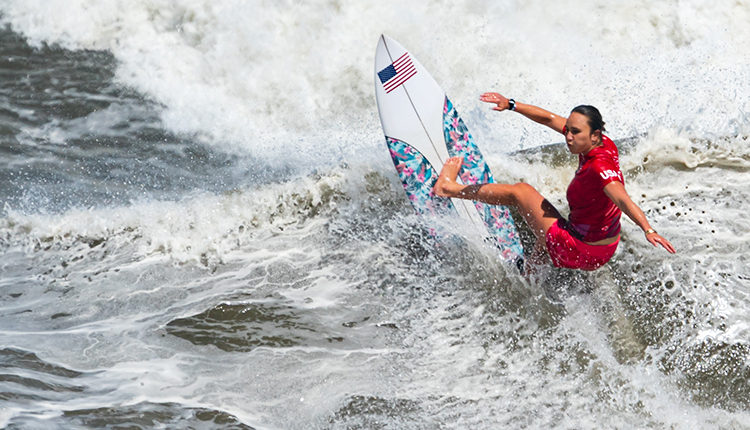
Surfing’s debut appearance in the Olympic Games has culminated with historic performances and an increased prominence of a sport that raises awareness about ocean conservation.
Fernando Aguerre, president of the International Surfing Association, La Jolla, California, says, “Seeing the first Olympians step atop a podium with medals around their neck brought tears to my eyes. This moment was one big step in our mission to make the world a better place through surfing. Olympic Surfing has exposed a whole new generation of youth to the sport. Children watching this moment from all around the globe now know about surfing and have their own dreams to pursue. They know that becoming an Olympic surfer is a goal that is possible to achieve.”
After three days of youthful, high-performance action at Tsurigasaki Beach, Brazil’s Italo Ferreira and USA’s Carissa Moore rose to the pinnacle of Surfing and forever etched their names into the history books as the first Olympic Surfing Champions at Tokyo 2020.
Ferreira’s Gold has earned him the trifecta of top surfing accomplishments – a World Surf League Championship Tour Title in 2019, a World Surfing Games Gold Medal also in 2019, and now an Olympic Gold Medal.
“All of my accomplishments have been important to me, but I think this Olympic Gold means the most because I was the first one,” said Ferreira. “But all surfers made history here. Every surfer has a piece of this Gold Medal. I truly believe that the Olympics will change our lives. Not just the medalists, but for all the surfers that competed in this historic event.”
Moore, a four-time WSL World Champion and ISA World Surfing Games Copper Medalist, has now added a prestigious Olympic Medal to her trove of accomplishments.
“The scale of this event felt so much bigger,” said Moore. “Getting to share the sport with so many people that maybe have never even watched surfing was super special. As a Hawaiian, just seeing Duke Kahanamoku’s dream come true to have surfing in the Olympics is super special. It’s a big time for surfing to be recognized on this level.”
Rounding out the podiums were Japan’s Kanoa Igarashi with Men’s Silver, South Africa’s Bianca Buitendag with Women’s Silver, Australia’s Owen Wright with Men’s Bronze, and Japan’s Amuro Tsuzuki with Women’s Bronze.
Duke Kahanamoku, an Olympic Gold Medalist in Swimming revered as the father of modern surfing, planted the seed of Olympic Surfing in 1912 when he first expressed his wish to see the sport included in the Olympics while atop the podium at the Stockholm Games.
More than a century later, Duke’s dream has come full circle. Not only did the sport gain inclusion in the Games, but Moore, a Hawaiian, became the first Women Olympic Champion.
“Duke Kahanamoku is our ambassador of Aloha,” said Moore. “I recently watched a documentary about him and really got to learn about his life, how he treated people unconditionally, with love and kindness. He brought surfing to many parts of the world, and it was his dream to have surfing in the Olympics.
“I hope that the audience watching – the widest reaching to ever watch a surfing event – could feel the power of surfing, the connection with nature, and the youthful energy that we brought to the Olympics,” says Aguerre. “I hope that the stoke and joy of our sport resonates around the world and shows people how sport can be used to make positive social change. Additionally, as daily users of our oceans, it’s my hope that the rest of the world can join us in taking better care of them.”
He adds, “Tokyo 2020 was without a doubt a resounding success. We even finished the day with a beautiful rainbow. The future of Olympic Surfing is looking bright with inclusion in Paris 2024, and then two clear opportunities for surfing in LA 2028 and Brisbane 2032. This is a great start to surfing’s Olympic journey.”


